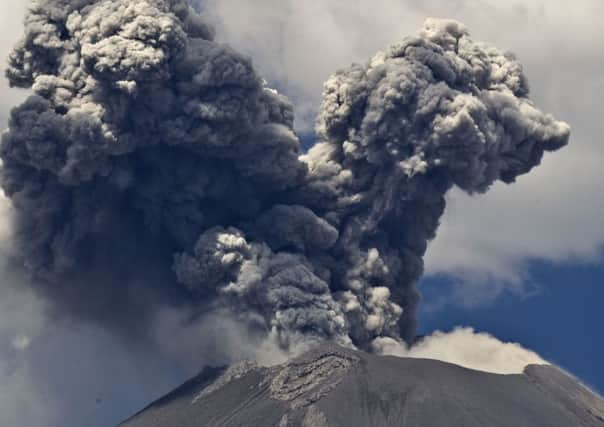‘Volcanoes mean climate change over-estimated’


The atmospheric impact of volcanic eruptions was not included in climate forecasts, leading them to overestimate the speed at which temperatures would rise, say scientists.
Critics have questioned the predictions of climate experts after surface temperature measurements indicated a slow-down in warming since 1998.
Advertisement
Hide AdAdvertisement
Hide AdThe new research suggests volcanic activity played a major role in bringing about the climate change “pause”.
Other explanations have included natural climate variability and observational errors. Incorporating volcanic influences into the climate models reduced the difference between observed and simulated trends by up to 15 per cent.
The US scientists, led by Dr Benjamin Santer, from the Lawrence Livermore National Laboratory in California, wrote in the journal Nature Geoscience: “We show that climate model simulations without the effects of early 21st-century volcanic eruptions overestimate the tropospheric warming observed since 1998. To reduce these uncertainties, better observations of eruption-specific properties of volcanic aerosols are needed, as well as improved representation of these eruption-specific properties in climate model simulations.”
Dr Santer said yesterday: “This is a complex detective story. Volcanoes are part of the answer but there’s no factor that is solely responsible for the hiatus.”
Volcanoes are a wild card for climate change – they cannot be predicted and big eruptions, most recently of Mount Pinatubo in the Philippines in 1991, can dim global sunshine for years. Powerful eruptions send small sulphur droplets, or aerosols, high into the atmosphere where they act as a mirror to reflect the sun’s rays and prevent them warming the ground.
Dr Santer said other factors, such as a decline in the sun’s output, linked to a natural cycle of sunspots, or rising Chinese emissions of sun-blocking pollution, could also help explain the recent slowdown in warming.
In 1991, the second-largest volcanic eruption of the 20th century occurred when Mount Pinatubo in the Philippines exploded with enormous force, killing almost 1,000 people and causing widespread damage.
Millions of tonnes of ash and gas were blasted into the atmosphere from the mountain, reaching an altitude of 21 miles.Over the next two years, average temperatures across the planet fell by up to 0.5C.
Advertisement
Hide AdAdvertisement
Hide AdThe research showed that Mount Pinatubo and the earlier major eruption of El Chichon in Mexico in 1982 “had important impacts on decadal changes in warming rates”. In addition, 17 “small” eruptions occurred after 1999, their cumulative effect increasing the reflective effect of aerosols in the upper atmosphere by up to 7 per cent.
British climate expert Professor Piers Forster, from the University of Leeds, said: “Volcanoes give us only a temporary respite from the relentless warming pressure of continued increases in carbon dioxide.”
Explaining the hiatus could bolster support for a UN climate deal, due to be agreed by almost 200 governments at a summit in Paris in late 2015 to avert ever more floods, droughts, heatwaves and rising sea levels.
A study by the UN Intergovernmental Panel on Climate Change (IPCC) last year suggested natural variations in the climate, such as an extra uptake of heat by oceans, could help explain the warming slow-down.
The IPCC projected a resumption of warming in coming years and said that “substantial and sustained” cuts in greenhouse gas emissions were needed to counter climate change.